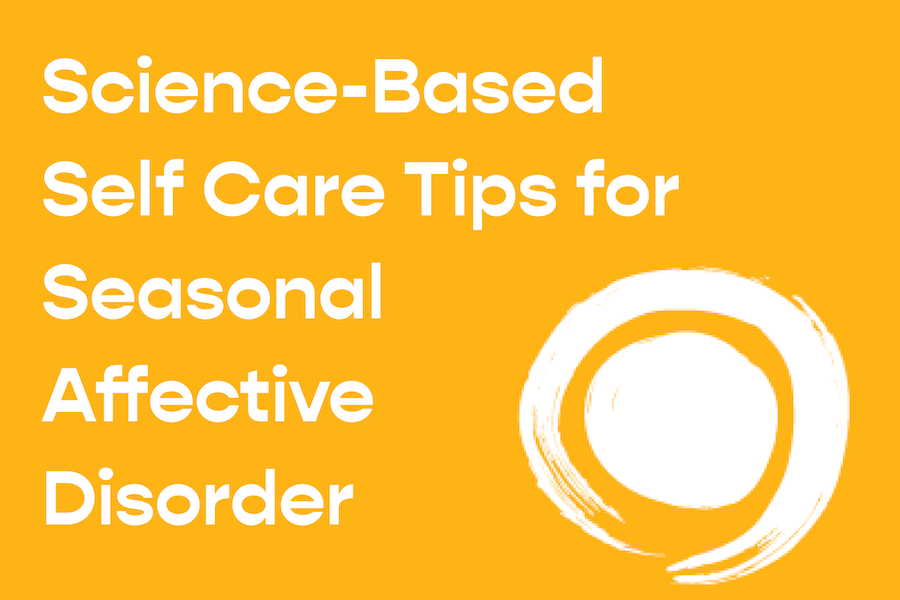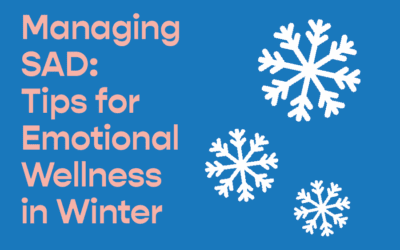As the seasons change, so can our moods and energy levels. For some, the onset of winter can bring a condition known as Seasonal Affective Disorder (SAD). SAD is a form of depression that typically occurs during the fall and winter months, when daylight hours are shorter. The decrease in sunlight exposure during this time can disrupt our internal clock and may lead to feelings of depression. This lack of sunlight may also affect brain chemicals like serotonin and melatonin, which can cause disturbances in sleep and mood.
While it can be challenging to navigate the “winter blues,” there are evidence-based self-care strategies to help manage and alleviate the symptoms of SAD.
According to the National Institute of Mental Health, one of the most effective treatments for Seasonal Affective Disorder is light therapy.[1] Exposure to a bright light that mimics natural sunlight can help regulate mood and improve energy levels. You can do this by using a light therapy box, ideally in the morning, for 30 minutes daily. The recommended intensity of the light emitted from a light box is 10,000 lux.
Prioritize Exercise
Physical activity can help alleviate stress and anxiety, two factors that can increase symptoms of SAD. Exercise increases the production of endorphins, which are hormones that promote feelings of happiness and reduce stress. The Cleveland Clinic suggests a minimum of three 30-minute sessions per week to help alleviate symptoms of depression associated with SAD.[2]
Spend Time Outdoors
If you have symptoms of SAD, getting outside to take advantage of the available sunlight during the fall and winter months can help. Even on cloudy days, outdoor light can be beneficial.[3] Find ways to implement outdoor time, especially during the early morning hours, by taking a long walk or bundling up and heading to a nearby park.
Eat Nutritious Meals
Symptoms of SAD may include increased cravings for starchy or sweet foods, but making the mindful choice to eat healthy foods can give you the proper nutrition and energy you need to help alleviate feelings of depression. Eating foods with omega-3 fatty acids, vitamin D, and complex carbohydrates can support mental health and overall well-being.[4]
Connect with Others
Make an effort to connect with friends and family regularly. Engaging in social activities and maintaining a support system can provide emotional support during the winter months.[5]
Find Support
Visit your healthcare provider for an evaluation or talk to a mental health specialist like those at Josselyn. They can discuss treatments that may be helpful.
[1] “Seasonal Affective Disorder.” National Institute of Mental Health, https://www.nimh.nih.gov/health/topics/seasonal-affective-disorder/index.shtml
[2] “Seasonal Depression (Seasonal Affective Disorder).” Cleveland Clinic, 10 April 2022, https://my.clevelandclinic.org/health/diseases/9293-seasonal-depression
[3] “Seasonal Affective Disorder: How to Cope.” Yale Medicine, 24 Oct 2022, https://www.yalemedicine.org/news/seasonal-affective-disorder-how-to-cope
[4] “Seasonal Depression (Seasonal Affective Disorder).” Cleveland Clinic, 10 April 2022, https://my.clevelandclinic.org/health/diseases/9293-seasonal-depression
[5] “Seasonal affective disorder (SAD).” Mayo Clinic, 14 Dec. 2021, https://www.mayoclinic.org/diseases-conditions/seasonal-affective-disorder/diagnosis-treatment/drc-20364722




